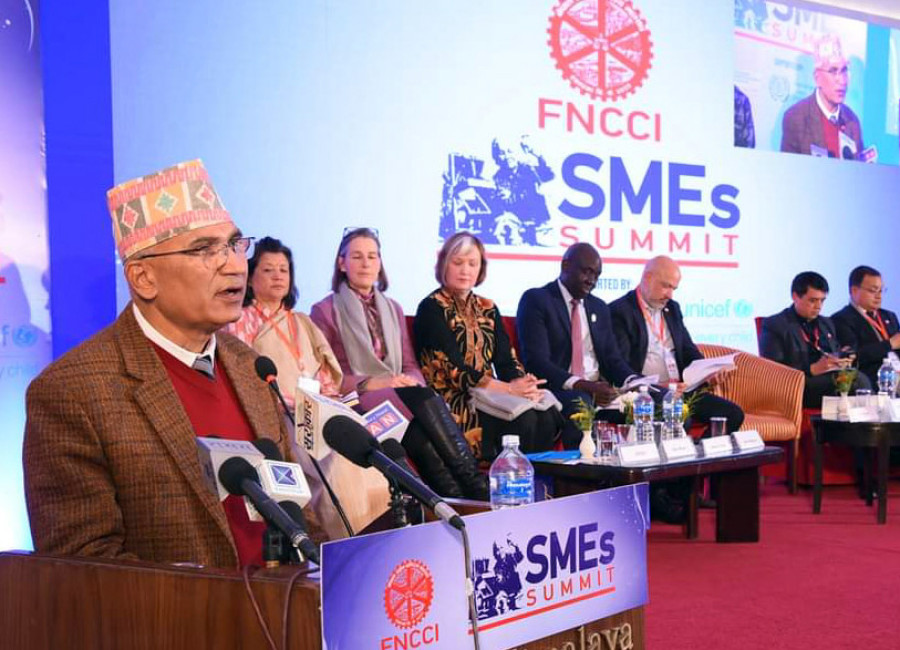Money
Finance Minister to implement startup guidelines soon
Entrepreneurs say the government's lackadaisical attitude towards startups has discouraged business innovators and there is no startup business spirit in the market.
Krishana Prasain
Finance Minister Bishnu Prasad Paudel, on Monday, said he would soon implement the startup guidelines abandoned by the previous government.
“We had provisioned Rs1 billion fund for startup promotion in the 2021-22 budget. But we could not implement it as the government changed,” said Paudel, speaking at the Small and Medium Enterprises (SMEs) Summit organised by the Federation of Nepalese Chambers of Commerce and Industry.
The finance ministry had prepared the Business Credit Flow Work Procedure which was slated to come into effect in July 2021.
The government had then decided to give up to Rs2.5 million for a startup in seed capital at a 1 percent interest rate without collateral, if the project was convincing, to encourage youth entrepreneurs.
Seven years ago, in 2015-16, the government announced in its budget statement that an Rs500 million fund would be established to groom start-ups and innovators.
Again in 2019-20, the government announced a cash subsidy of up to Rs5 million for promising new businesses. It started preparing a work procedure, but that got nowhere.
In 2020-21, the government created an Rs500 million start-up fund to issue loans at 2 percent interest to encourage innovative entrepreneurs hit by the pandemic.
But start-ups were disappointed once again.
Entrepreneurs say the government’s lacklustre attitude towards start-ups has discouraged business innovators, and there is no start-up business spirit in the market like there was before the Covid-19 pandemic.
Accepting that there is no consistency in policies, Paudel urged the private sector to pinpoint where the policy is unclear.
The private sector says that the processing works—from documentation to release of funds—are full of hassles.
Babacar Faye, International Finance Corporation’s (IFC) resident representative in Nepal, said that the government needs to support the Small and Medium Enterprises (SMEs) in order to help them thrive.
“Only commitment won’t assure the SMEs growth. The commitment should be translated into a reality,” Faye said.
“There is a need to forge a partnership among the stakeholders across the SMEs ecosystem—from government, policymakers, regulators, and the private sector—to support the SMEs’ development,” he added. “We are ready to work consensually for the improvement of SMEs within this year and next year.”
According to the federation, the industrial contribution to the country’s gross domestic product (GDP) is 5.6 percent, of which, 90 percent is from the SMEs.
In the last fiscal year, 309 large industries were registered and 35,069 SMEs. The SMEs are providing jobs to 1.7 million people in Nepal, the federation said.
Presenting a report, IFC said that 85 percent of Nepal's labour pool is employed by SMEs. In Nepal, one SME has, on an average, 11.6 workers.
The source of borrowing for 53 percent of SMEs in Nepal is through family and friends, 26 percent from other sources, 13 percent from financial institutions and 8 percent from savings, according to IFC.
“Access to finance is one of the key challenges faced by SMEs,” the IFC said.
Minister Paudel said anyone is free to inform the Finance Ministry if they face difficulties while paying taxes.
Shekhar Golchha, president of the FNCCI, said the sharp rise in the interest rates is creating difficulty for SMEs.
“The cost of production has increased due to the rise in fuel and raw material prices. As a result, the production capacity of small and large-scale industries has declined by 60 percent,” Golchha said.
Golchha said that until mid-December, the banking and financial institutions have provided total loans of Rs423.15 billion to SMEs, which is only 8.86 percent of the total credit flow. “That’s very less. The outlay needs to be increased.”
The government needs to provide facilities and subsidies to bring the SMEs into the formal system since many SMEs are operating without being registered.




 9.6°C Kathmandu
9.6°C Kathmandu















